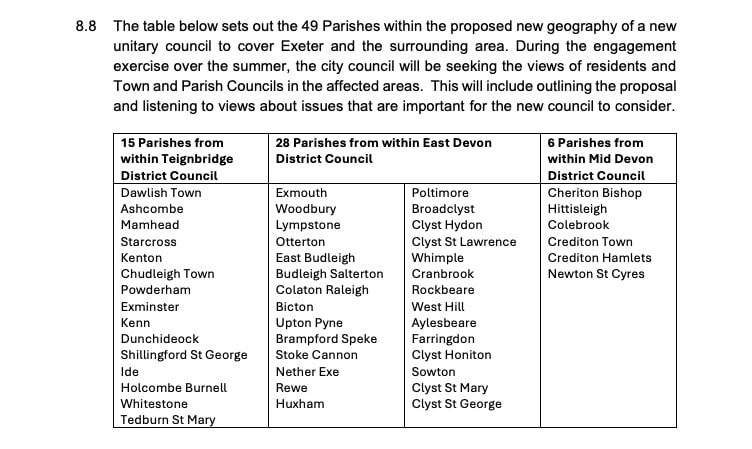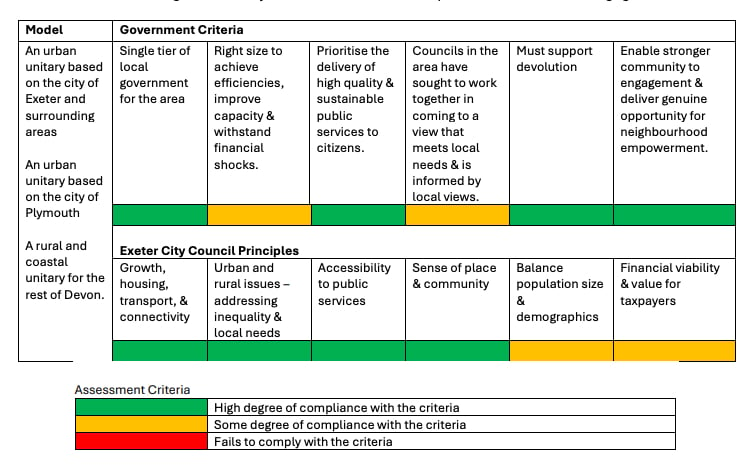SIX locations currently in the current Mid Devon District Council area: Cheriton Bishop, Hittisleigh, Colebrooke, Crediton Town, Crediton Hamlets and Newton St Cyres as well as other areas surrounding Exeter could be included in a new Greater Exeter states a new report by Exeter City Council.
The conclusion of a new report by Exeter City Council on the future reorganisation of local government in Devon says that creating new unitary councils in Devon will improve services, strengthen identity and boost economic growth throughout the county.
The report, which will be discussed by Exeter councillors on Thursday, August 14, recommends creating a new unitary council for Exeter and the surrounding area.
If agreed by Exeter councillors, a six-week period of public, resident and stakeholder engagement will begin.

The City Council says the proposal reflects Exeter’s position as a major urban hub with strengths in housing growth, knowledge economy, innovation, education, climate science and transport connectivity.
It aims to create financially viable, efficient authorities aligned to geography, population and economic potential, recognising the distinct needs and identities of urban and rural areas.
The proposal recognises the importance of Devon’s two major urban centres - Exeter and Plymouth - as engines for economic and housing growth for the benefit of the whole county.
The restructure would create:
• An urban unitary council for Exeter and the surrounding areas
• An urban unitary council for an expanded Plymouth
• A rural and coastal unitary council for the remainder of Devon.
The new unitary council for Exeter and the surrounding area aims to improve outcomes for residents, deliver value and enhance community involvement, for example, by working more closely with Parish and Town Councils.
Exeter City Council Leader Phil Bialyk said the proposed new council’s economic power would help to ensure resilience and strengthen the region against economic shocks.
He said: “Reorganisation presents a once in a generation opportunity to reshape public services to improve outcomes for residents, address inequalities and deliver value for money.
“Exeter is the regional capital and acts as the engine for growth of our dynamic and diverse urban and rural area and our important market towns.
“By joining forces with key locations close to the city – places with a strong connection and affiliation with Exeter - we can create a new unitary council which accelerates growth and allows communities to thrive, not just in Exeter and the surrounding areas but throughout Devon and the wider region. If localities are drawn too wide, it risks loss of community identity and cohesiveness”.

The proposed new urban unitary council for Exeter and the surrounding area would serve a population of around 256,273 rising to 294,079 by 2040.
It would include:
• 15 locations currently in the Teignbridge District Council area:
Dawlish Town, Ashcombe, Mamhead, Starcross, Kenton, Chudleigh Town, Powderham, Exminster, Kenn, Dunchideock, Shillingford St George, Ide, Holcombe Burnell, Whitestone and Tedburn St Mary.
• 28 locations currently in the East Devon District Council area:
Exmouth, Woodbury, Lympstone, Otterton, East Budleigh, Budleigh Salterton, Colaton Raleigh, Bicton, Upton Pyne, Brampford Speke, Stoke Cannon, Nether Exe, Rewe, Huxham, Poltimore, Broadclyst, Clyst Hydon, Clyst St Lawrence, Whimple, Cranbrook, Rockbeare, West Hill, Aylesbeare, Farringdon, Clyst Honiton, Sowton, Clyst St Mary and Clyst St George.
• 6 locations currently in the current Mid Devon District Council area:
Cheriton Bishop, Hittisleigh, Colebrooke, Crediton Town, Crediton Hamlets and Newton St Cyres.
Bindu Arjoon, Exeter City Council’s Chief Executive, said: “A new unitary council for Exeter and the surrounding area will allow us to create services that are designed around the specific needs of local communities.
“The proposal supports growth, community identity, resilience, and service delivery in cities, coastal towns and dispersed rural areas.
“We will be keen to hear from people in affected areas and will be engaging with residents and stakeholders and working with our key public sector stakeholders like the health service, police and education sector, MPs, district, town and parish councils, businesses, the voluntary sector and key service users”.

If councillors support the recommendations in the report, wide ranging engagement will take place from August 15 until September 26.
The City Council will discuss the report at an Extraordinary Meeting of Council on Thursday, August 14.
• What do you think of the proposals?
Why not share your views with fellow Courier readers?
Write a letter with your name, address and a contact number, to: The Editorial Manager, Crediton Courier, c/o Crediton Library, Belle Parade, Crediton EX17 2AA.
Alternatively, email it to: [email protected] .





Comments
This article has no comments yet. Be the first to leave a comment.